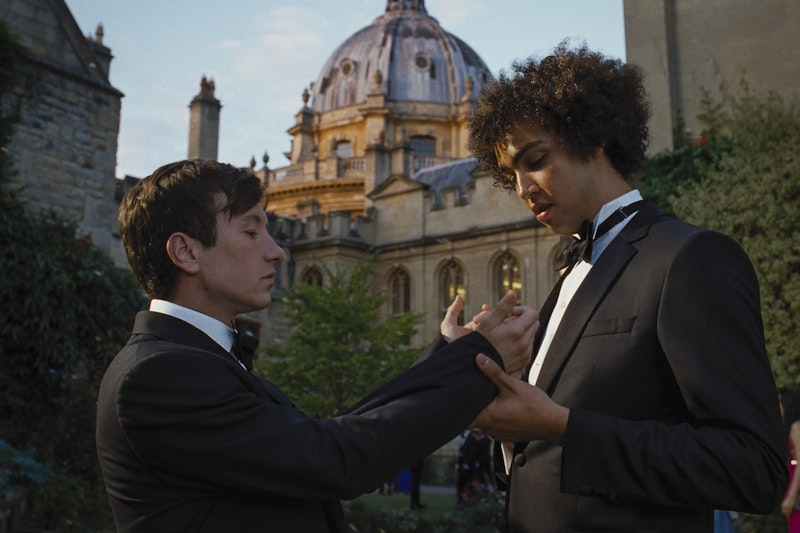Saltburn is a cute and weird new thriller that opened in the UK last week and in the U.S. in limited release a day before Thanksgiving.
I assumed that “saltburn” was the name of a novel from which is was adapted, but it’s an original script by British writer/actor Emerald Fennell (whose writing credits include Barbie and Killing Eve), and Saltburn is the name of the inherited estate of an aristocratic couple, a mentally ill Lord Catton (Richard Grant) and Lady Catton, an airheaded former model (Rosamund Pike). The Catton family includes two children, Felix (Jacob Elordi) and Venetia. The family entertains a constant stream of hangers-on who are financially dependent on the Cattons, while the Cattons are in turn dependent on their hangers-on for purpose and revivification. The hangers-on include a drug-addicted mistress of a dangerous Russian billionaire and a biracial American cousin whose own parents have fallen on somewhat hard times. Interestingly, salt is what you use to burn slugs and snails, dehydrating them. And it’s also what you use to form a magic circle to keep out demons.
Unfortunately for the Cattons, one of the cardinal rules in keeping safe from demons, vampires, etc. is that you don’t invite them in. But the Cattons need a stream of new people, as sister Venetia says at one point of her brother’s new friend Oliver Quick (Barry Keoghan) “you’re this year’s toy.” (Margot Robbie, fresh of her role as Barbie, is a producer for Saltburn.)
Oliver and Felix are freshman at Oxford (Fennell’s alma mater). Felix is there only because he is from an aristocratic family. Oliver’s the equivalent of a national merit scholar, a kid with perfect grades and SAT scores. In an early scene where he meets with his advisor he casually says that he read all 50 of the books Oxford had suggested to incoming freshman as summer reading. The advisor is shocked and admits he has never read some of these books. Oliver says he thought it was mandatory.
Unfortunately, being a brilliant student doesn’t give Oliver social acceptance. In another early scene the only person who will speak to him in the dining hall is a mentally unstable math savant.
Oliver’s a savant as well, and he quickly realizes that he’ll be more interesting to the young aristocrats if, instead of being a middle- or upper-middle class boy who’s smarter than them, he’s the poverty-stricken child of drug addicts who still managed to get into Oxford. Oliver, who’s either gay or bisexual, falls in love with Felix.
All of the Oxford students, and the Saltburn estate guests and residents, are big drinkers, drug users, sluts, even sex addicts. Their idea of an entertaining social event is cocaine, vodka, and karaoke, far from the dinners and waltzes of Jane Austen. A good portion of the younger guests are sexually fluid. Perhaps that’s why it’s easy for someone like Oliver to trick them, and so he too ends up invited inside to Saltburn, as a friend and “toy,” if not a bedmate, for Felix, his guest for the summer.
At this point Fennell could’ve written a story about the degeneracy of the Western ruling class, whose ideal is to dress and act like a Kardashian and be worshipped for this, and how that opens them up to inimical forces. What she does is less interesting—she mines the British tradition of gothic horror literature and fuses it with a retelling of The Talented Mr. Ripley. Saltburn, Oliver, and lots of other characters, all become very creepy. It’s good a lot of scenes happen in fog or darkness, helping the audience believe Keoghan (who’s 31) is the 19-year-old Oliver Quick—in well-lit closeups his face and eyes make it clear he’s no longer even in his mid-20s.
Creepy scenes include the Saltburn estate maze, at the center of which is a statute of a Minotaur, like the original Cretan labyrinth. As in the M.R. James tale about an inherited estate, the maze proves lethal. The figure turns out just to be nymphomaniacal sister Venetia in diaphanous white bed clothes, hoping to find a house guest for sex. She eventually lures Oliver (or is he manipulating her?) even though he seems to be in love with her brother—in one scene he spies on Felix masturbating in the giant bathtub in their shared bathroom, and then, after Felix goes to bed, sticks his face in the bathwater, drinks it, and then performs a rim job on the drain. Pulling off Venetia’s underwear, fingering her and moving to eat her out, she protests that it’s the wrong time of the month. To which Oliver replies by licking her menstrual blood off his fingers, then putting his fingers in her mouth, and, before beginning cunnilingus, offering “I am a vampire!”
It’s the season for sex gone creepy. The new Showtime series Fellow Travelers about gays persecuted by Joe McCarthy, is giving viewers a lot of kink, including toe-sucking, foot-licking, anal intercourse, toilet sex, and bondage. Another Showtime series, The Curse, has a lot of full frontal male nudity. Saltburn has them both beat, although apparently in both cases scenes improvised by actor Barry Keoghan, who seems happy to show his stacked muscular little body (he’s 5’8”) and his large (when flaccid!) penis. In one scene post-funeral, he has coitus with the loose dirt over a grave. In another he dances naked throughout an entire house, celebrating the death of someone he believes did him wrong.
Saltburn isn’t the meaningful movie it could’ve been, but instead a curiosity and more intellectual and less viscerally gruesome than a usual horror movie.

